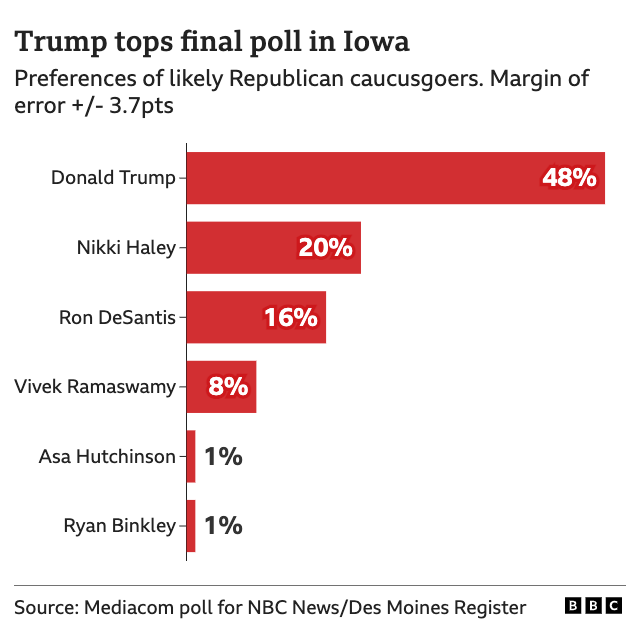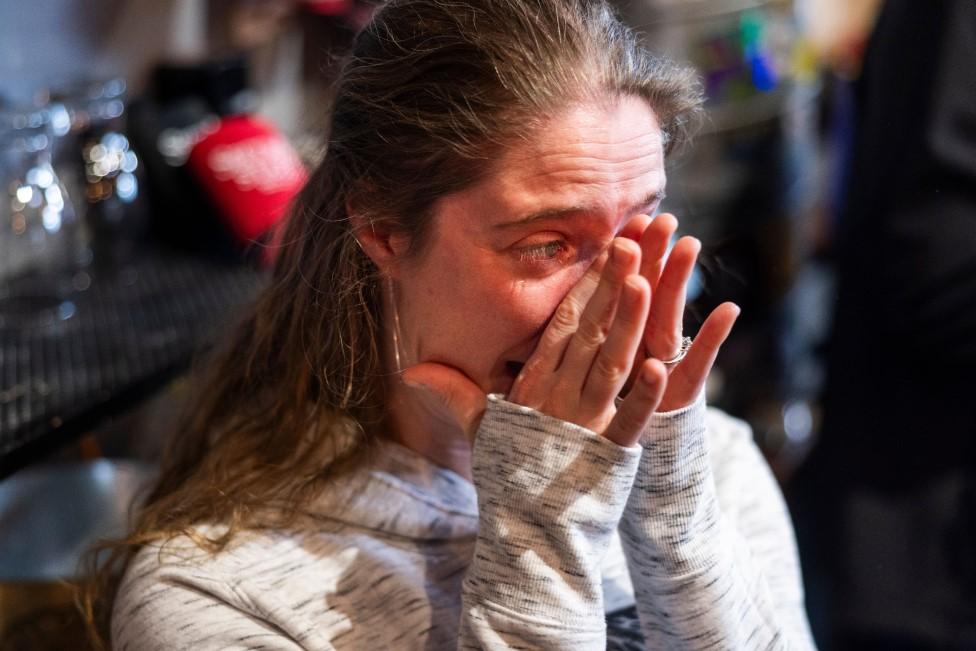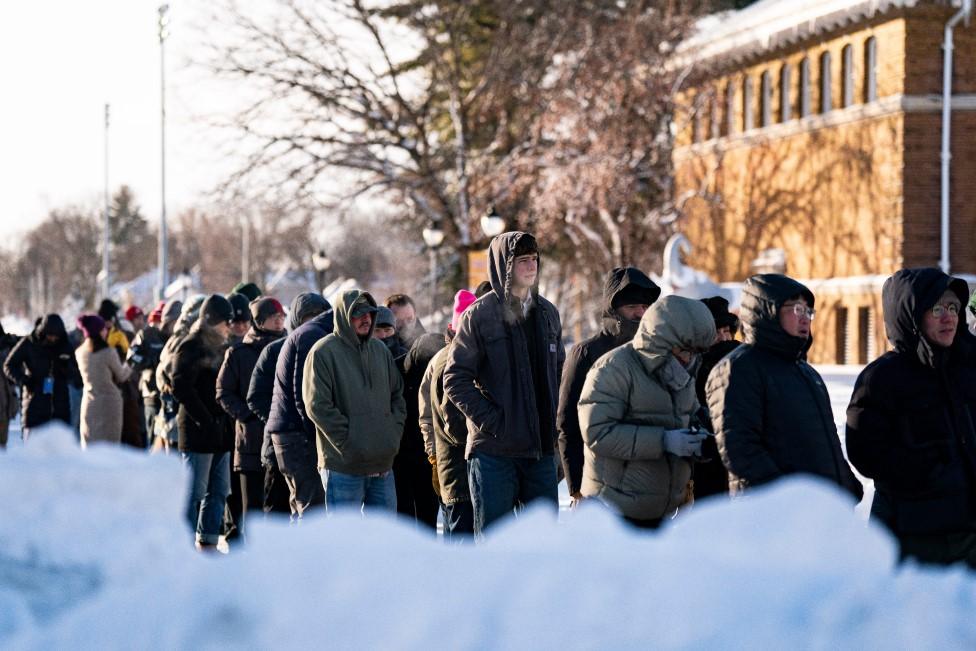Five Republican storylines to watch for at Iowa caucuses
- Published
Watch: Temperatures low in Iowa, but the excitement and stakes are high
After months of campaigning, Republican voters - or at least a few hundred thousand in the Midwestern state of Iowa - will finally have an opportunity to weigh in on who their party's 2024 presidential nominee should be.
The field has narrowed considerably over recent months, but one thing has remained constant. Former president Donald Trump continues to tower over his party's future, despite the best efforts of his rivals.
That's why so much of the drama in the build-up to the Iowa caucuses has been focused on snow accumulations and how far the wind chill will drop, rather than who may emerge victorious.
But there are still key storylines that will develop as Monday night's results come in.
Trump's knockout punch
Unless there is a dramatic polling error, Donald Trump is going to win the Iowa caucuses.
He has broad and enthusiastic support among the state's Republicans, and a ground organisation that is significantly more sophisticated than the shoestring team that delivered a second-place finish behind Texas Senator Ted Cruz in 2016.
What the former president and his team are looking for in the state is more than just a win. They want the kind of crushing victory that they hope removes all doubt that Mr Trump will be the party's nominee at the Republican national convention this July.

If he can run up the score in Iowa - winning with more the 50% of the vote, for instance - it could blunt Nikki Haley's momentum heading into New Hampshire, the second state to vote, and mortally wound Ron DeSantis's campaign.
A true knockout punch may not be possible, as Iowa historically has only reduced the field, not crowned the ultimate nominee. But with Mr Trump essentially campaigning as an incumbent president, denying that he was even defeated in 2020, this is no typical year.
A coveted second place
If Mr Trump's dominating poll position proves to be an accurate reflection of Iowa Republican voter mood, the real battle in the state is for second place.
Last Wednesday's acrimonious two-person debate between Florida Governor Ron DeSantis and former UN Ambassador Nikki Haley put the high stakes here in stark relief. If one of these two opens some daylight between the other in the final Iowa results, it could elevate that candidate as the top alternative to Mr Trump in the contests to come.

Iowa voter tearful listening to Haley speak
A close finish does neither any good, essentially boosting the divide-and-conquer strategy that helped Mr Trump win the nomination in 2016 and would give him a glide path to victory this time around.
Even if one candidate banks a comfortable runner-up finish in Iowa, there's no guarantee that it will translate into future success and an opportunity to catch the former president. A slim chance is better than no chance at all, however.
DeSantis's last stand
Ms Haley and Mr DeSantis may be battling for second place, but their situations are far from identical.
New Hampshire, the next state on the Republican calendar, is much more fertile electoral ground for Ms Haley, who is backed by its governor and is showing strength among its large percentage of college-educated voters and political independents.
Recent polls there have shown her cutting Mr Trump's lead to near single digits, well ahead of the Florida governor.
Mr DeSantis, on the other hand, has demonstrated little ability to connect with voters in New Hampshire. Consequently, his campaign is much more reliant on a positive showing in Iowa, where he has built an extensive grassroots operation and benefited from key endorsements from the state's governor and leaders in its evangelical community.

More on the US election

If he stumbles despite these advantages, his campaign may sink beneath the waves in New Hampshire. Not that his team is admitting as much.
"This campaign is built for the long-haul," said DeSantis campaign spokesman Andrew Romeo. "We hope Donald Trump is ready for a long, scrappy campaign."
Those are tough words, but it's unlikely that Mr DeSantis would have the money and momentum to back them up if he flops in Iowa.
A winter X factor
The Iowa caucus format has always been a test of campaign organisational skill and supporter enthusiasm, given the time commitment required of participants. Add in punishing cold and icy roads, and it is even more likely that the caucus winner will be the candidate who has the most dedicated supporters.
That may be Mr Trump, whose loyal fans have been known to brave all variety of conditions and wait in lengthy queues - some overnight - to attend their man's rallies.
Or maybe it's Mr DeSantis and his play for Iowa evangelical voters, who are among the most dedicated caucus participants.

Queuing in the snow for a Trump event in Indianola, Iowa
Perhaps Ms Haley will benefit, as her college-educated supporters tend to live in Iowa's metropolitan areas, where roads may be clearer of ice and caucus sites closer. Republican voters who adamantly oppose Trump may also be more motivated to face the elements on Monday night. And if they do, polls suggest they could break her way.
Iowa is no stranger to harsh winter weather, but this particularly frigid environment has injected a measure of unpredictability in what has otherwise been a fairly stable run-up to the caucus night and made meteorological forecasters as prized as political pundits for the past few days.
"Any pollster who tells you they know what turnout will be on Monday night given the historic weather conditions isn't telling the truth," the DeSantis campaign wrote in a memo to donors and supporters obtained by CBS News.
Every candidate not named Donald Trump is heading into Monday night hoping this is true.
Yes, Asa Hutchinson is still running
With former New Jersey Governor Chris Christie out, Vivek Ramaswamy and Asa Hutchinson are the only two other candidates with enough support to register even a blip in Iowa.
It's hard to imagine either finding any meaningful success in the state at this point - or, for that matter, in any of the states to come. But they can still hope for a miracle. Monday night may end up being their first real dose of harsh reality.